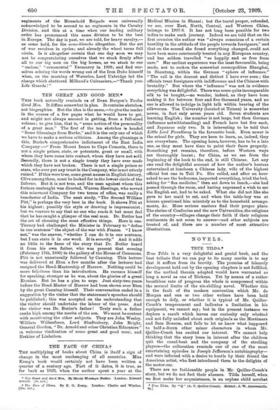TEN GREAT AND GOOD MEN.* Tars book naturally reminds us
of Dean Burgon's Twelve Good Men. It differs somewhat in plan. It contains sketches, not biographies. But the idea is the same,—to give the reader in the course of a few pages what he would have to get, and might not always succeed in getting, from a full-sized volume ; to give him, that is, "some notion of the personality of a great man." The first of the ten sketches is headed Some Gleanings from Burke," and it is the only one of which we have to make a serious criticism. Among the gleanings is this, Burke comprehensive indictment of the East India Company :—" From Mount Imam to Cape Comorin, there is not a single prince, state, or potentate, great or small, with whom they have come into contact, whom they have notsold. Secondly, there is not a single treaty they have ever made which they have not broken. There is not a single prince or state, who ever put any trust in the Company, who is not utterly ruined." If this were true, some great names in English history, Clive among them, must be looked for in the lowest circle of the Inferno. But it is not true, and the man against whom this furious onslaught was directed, Warren Hastings, who served this miscreant Company for two terms of office, was really a benefactor of India. The next study, "The Second William Pitt," is perhaps the very best in the book. It shows Pitt at his highest; possibly the style or drawing is impressionist ; but we venture to say that no one who reads it but must feel that he has caught a glimpse of the reed man. Dr. Butler has the art of choosing the most effective things. Here is one. Tierney had challenged the Minister in February to "define in one sentence" the object of the mar with France. "I know not," was the answer, "whether I can do it in one sentence, but I can state it in one word. It is security." And it adds no little to the force of the story that Dr. Butler heard it from his own father, who was present that evening (February 17th, 1800) in the gallery of the House of Commons. Pitt is not unnaturally followed by Canning. This lecture was delivered at Eton a few months after the lecturer had resigned the Head-Mastership of Harrow. Nothing could be more felicitous than his introduction. He excuses himself for speaking, stranger as he was, about the glories of a great Etonian. But he Ilan a plea to urge. Just sixty-two years before the Head-Master of Harrow had been shown over Eton by the great Canning himself. Their conversation ended in a suggestion by the visitor that the statesman's speeches should be published ; this was accepted on the understanding that the visitor should undertake the labour of the press. And the visitor was Dr. Butler's father ! Truly such a father ranks high among the merits of the son. We must be content with mentioning the other subjects. They are John Wesley, William Wilberforce, Lord Shaftesbury, John Bright, General Gordon, "Dr. Arnold and other Christian Educators" (a welcome vindication of -some great and good men), and Erskine of Linlathen.










































 Previous page
Previous page